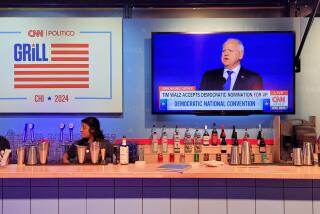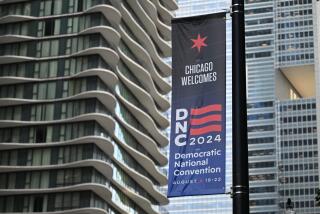New ethics rules won’t spoil parties
- Share via
WASHINGTON — In time-honored fashion, members of Congress attending the Democratic National Convention in Denver will find a social calendar crammed with glitzy parties and lavish entertainment, all courtesy of those tireless friends of the powerful: Washington lobbyists.
Lawmakers can sample single-malt Scotches, single-barrel bourbons or politically themed cocktails like the Blue State and the Maverick as guests of the Distilled Spirits Council. They can rub shoulders with celebrities like actor Ben Affleck and comedian Sarah Silverman, thanks to the nation’s professional poker players.
Or they can just kick back in hospitality suites provided by corporate sponsors as diverse as railroad companies and Google Inc.
But wait a minute. Didn’t a reform-minded Congress pass ethics rules intended to stop just this sort of thing? In the wake of the Jack Abramoff lobbying scandal, didn’t it impose new restrictions on members attending convention events hosted by lobbyists?
Indeed it did. But because of the way that Congress wrote the rules, many of the old practices may still continue with seemingly little more than cosmetic changes.
Take those star-studded poker games. The new law contains an exemption for events that benefit a charity. So the Poker Players Alliance has stipulated that the proceeds of its tournament will benefit Paralyzed Veterans of America.
The law also prohibits a member from attending an event that honors the member. But the House Ethics Committee has interpreted this to mean that parties recognizing a group of members are fine.
So Visa and U.S. Bank are helping to sponsor a reception for first-term lawmakers in a Denver town house rented by the lobbying firm Parven Pomper Strategies Inc., which counts Chevron and Pfizer among its clients.
And enjoying all those fancy whiskeys and special cocktails is permissible under the new law too, in part because the distillers will provide a presentation promoting social responsibility and the prevention of underage drinking.
“Adjustments have been made, but it is along the same lines of events that we’ve had in the past,” said Frank Coleman, senior vice president of public affairs at the Distilled Spirits Council.
All this is not to say nothing has changed. The rules, and some politicians’ desire to campaign as reformers, have had a muting effect on the entertaining.
Despite some of the exemptions and generous interpretations, the conventions are no longer viewed as “ethics-free zones,” said Jan Witold Baran, an expert in ethics and campaign finance at the law firm Wiley Rein.
“That is not to say that there will be no parties at the conventions,” Baran added.
There will be at least 400 of them, according to a list compiled by the lobbying firm Quinn Gillespie & Associates and obtained by the Sunlight Foundation. Many will be sponsored by lobbying firms and corporations like AT&T; and Eli Lilly.
Even so, awareness of the new law is so high that Parven Pomper Vice President Alixandria Lapp, for one, made sure to run its reception menu by a lawyer before taking it to the caterers. Under what is known as the “toothpick rule,” a reception can offer only food and refreshment of a nominal value.
“We are just following the guidelines of the ethics committee, and we are completely staying within what they have deemed appropriate,” Lapp said.
The whole thing has watchdog groups fuming. They say some of the interpretations violate the spirit of the new law, the Honest Leadership and Open Government Act.
“I don’t like the role of stepping in and being a party pooper,” said Craig Holman, a government affairs lobbyist with the nonpartisan watchdog group Public Citizen. But, he added, “it is the members of Congress that will have to face the consequences of any violations.”
As for that reception for House freshmen, Holman said, “I would be astounded if a single freshmen Democrat dared show up at that party. It is just hypocrisy at its worse.”
--
More to Read
Get the L.A. Times Politics newsletter
Deeply reported insights into legislation, politics and policy from Sacramento, Washington and beyond. In your inbox twice per week.
You may occasionally receive promotional content from the Los Angeles Times.










